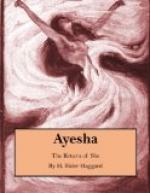“Fear not,” he said as he returned, “the huntsmen know that they are starved to-night, for to-morrow certain criminals will be thrown to them.”
Now we had reached the palace gates. Here the Khan bade us hide in an archway and departed. We looked at each other, for the same thought was in both our minds—that he had gone to fetch the murderers who were to make an end of us. But in this we did him wrong, for presently we heard the sound of horses’ hoofs upon the stones, and he returned leading the two white steeds that Atene had given us.
“I saddled them with my own hands,” he whispered. “Who can do more to speed the parting guest? Now mount, hide your faces in your cloaks as I do, and follow me.”
So we mounted, and he trotted before us like a running footman, such as the great lords of Kaloon employed when they went about their business or their pleasure. Leaving the main street, he led us through a quarter of the town that had an evil reputation, and down its tortuous by-ways. Here we met a few revellers, while from time to time night-birds flitted from the doorways and, throwing aside their veils, looked at us, but as we made no sign drew back again, thinking that we passed to some assignation. We reached the deserted docks upon the river’s edge and came to a little quay, alongside of which a broad ferryboat was fastened.
“You must put your horses into it and row across,” Rassen said, “for the bridges are guarded, and without discovering myself I cannot bid the soldiers to let you pass.”
So with some little trouble we urged the horses into the boat, where I held them by their bridles while Leo took the oars.
“Now go your ways, accursed wanderers,” cried the Khan as he thrust us from the quay, “and pray the Spirit of the Mountain that the old Rat and his pupil—your love, Yellow-beard, your love—are not watching you in their magic glass. For if so we may meet again.”
Then as the stream caught us, sweeping the boat out towards the centre of the river, he began to laugh that horrible laugh of his, calling after us—“Ride fast, ride fast for safety, strangers; there is death behind.”
Leo put out his strength and backed water, so that the punt hung upon the edge of the stream.
“I think that we should do well to land again and kill that man, for he means mischief,” he said.
He spoke in English, but Rassen must have caught the ring of his voice and guessed its meaning with the cunning of the mad. At least he shouted—“Too late, fools,” and with a last laugh turned, ran so swiftly up the quay that his cloak flew out upon the air behind him, and vanished into the shadows at its head.
“Row on,” I said, and Leo bent himself to the oars.
But the ferry-boat was cumbersome and the current swift, so that we were swept down a long way before we could cross it. At length we reached still water near the further shore, and seeing a landing-place, managed to beach the punt and to drag our horses to the bank. Then leaving the craft to drift, for we had no time to scuttle her, we looked to our girths and bridles, and mounted, heading towards the far column of glowing smoke which showed like a beacon above the summit of the House of Fire.




